ISRAEL-PALESTINE. ZPI encourages reflections from retreat participants, staff, members & others touched by our work and doing similar work from around the world, as part of the practice of bearing witness. Dina Awwad-Srour, a Palestinian, and Emma Sham-ba Ayalon, an Israeli, are friends who bonded over their appreciation of Etty Hillesum, a Dutch Jewish author of confessional diaries, killed during the Jewish holocaust. After Dina attended a Zen Peacemakers Auschwitz-Birkenau Bearing Witness Retreat in 2011, she ended up partnering with Emma to create a series of cards carrying wisdom quotes selected from Etty’s writings. They have created the cards as they have been holding rituals on the Holocaust Memorial Day in Israel/Palestine inspired by Etty Hillesum for the past twelve years now and the cards were first created on simple paper that were given to the participants at the end of the ritual that developed the idea to be officially published in the three languages. To explore more about the project or purchase the Etty Hillesum Cards see: www.ettyhillesumcards.com.
Here we also share a trailer of a documentary made about the project: Het denkende hart van Etty Hillesum. Zondag 10 mei NPO2 15.15 uur
——
Zen Peacemakers retreat in Weberbork – Reflections by Dina Awwad-Srour – Palestine
Almost ten years ago, I got to know the writings of Etty Hillesum. As Palestinians living under occupation, the word Holocaust was constantly used by the Israeli Media and Politicians as an «excuse» to occupy our lands. So for a long time, it was difficult for me to read anything about the Holocaust. But through reading Etty, I immediately connected to her story; first as a woman who is in search for inner freedom and building inner resources to stay connected to it, then learning and deciding to believe in humanity and seeing the human being in her «enemy». So through her I began to understand the deep trauma of the Jews and through that I also began to understand our own trauma as Palestinians.
As a peace activist for many years; the question «what could be a possible solution for the Palestine/Israel conflict?» is constantly asked.
So in 2011, I took part in the Zen Peacemakers Retreat in Auschwitz-Birkenau. The main reason why I decided to go was Etty Hillesum. Through reading Etty, I understood that actually if we want to have «peace» in Palestine/Israel, both people; Palestinians and Israelis (in addition to the Europeans) need to look and listen to the traumas of each other. Palestinians need to listen to the trauma of the Jews and the Jews need to listen to the trauma of the Palestinians and both need to listen to the traumas of the second and third generation of Germans whose ancestors were the perpetrators in the Holocaust. We need each other to heal our wounds to be able to build «peace» that is not based upon trauma but based upon a vision of a better future.
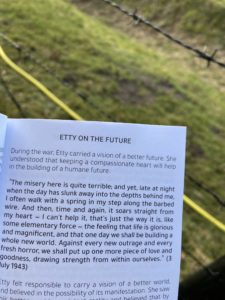 This year I took part together with my friend from Israel, Emma Sham-Ba Ayalon in the Zen Peacemakers Retreat in Westerbork. We were part of a ceremony, reading the 102,000 names of those who were transported from Westerbork to Auschwitz.
This year I took part together with my friend from Israel, Emma Sham-Ba Ayalon in the Zen Peacemakers Retreat in Westerbork. We were part of a ceremony, reading the 102,000 names of those who were transported from Westerbork to Auschwitz.
The experience of standing on the podium together; as a Jewish Israeli and a Palestinian Christian, to listen to others reading the names and saying the relation they have to those names; and then later to personally stand there together and reading the names was shaky and powerful. In the time Trump announced «his peace plan» and for us reading the names as a Palestinian and an Israeli was a message by itself that Emma and I carry through simply being there. I understood that before speaking about plans or agreements, we need to speak about the past from our hearts, and heal our traumas as both nations Palestinians and Israelis together with internationals. The real question is: how can we heal the trauma? What is needed for nations who carry traumas to heal it and to become able to move forward and create a new future that is not based upon the past?
When reading the diaries and the letters of Etty, I could witness a process full of ups and downs; failures and successes in the search for inner freedom and belief in humanity. I have learned a lot from Etty about how to step out from the triangle of Victim/Perpetrator/Savior. I have learned to choose a new position out of this triangle and I do it because I want a different and better future for the next generations and for that I need to step out of my comfort zone. And yet it is a huge challenge especially when as a Palestinian I am constantly treated with humiliation on checkpoints and then I need to find the inner freedom and choose my reaction again and again. And it is training.
We traveled to Holland, the four of us, through Ben Gurion Airport. And I said the four of us because we went to Westerbork with two film makers from Holland. Pat von Boeckel and Karin van der Molen contacted us and wanted to make a documentary about Etty and the affect of her words nowadays (The movie will be screened on the Dutch TV NPO2 on 10 May at 15:25 pm Holland Time. Here is a trailer for the movie: https://www.youtube.com/watch?v=eT_I1RjftOU&feature=youtu.be&fbclid=IwAR0dsdUt9KuzpNsnzVA5Wt30LDvlEPCxnSoAXfEl2yIi-eZyJYKwdvekC-8 ).
For me to travel through Ben Gurion Airport is a process. I first needed to apply for a visa to Holland in Ramallah/West Bank to the representative office of Holland; a process that took almost a month. Then I needed to apply to the Israeli army to get a special permit to travel through the airport. When we were in the airport – my three friends; two Dutch and an Israeli passed easily while I was taken on the side for security check – up.
I was calm and cooperated with four security guards, who each one took charge of checking something; my shoes, computer, bag, my body. The process was quite long. Then one security guy began opening my bag without my permission. This was a point that triggered my anger, so I told him: «open my bag when I am there». And then when I began taking out the things, my bag was full of packages of Etty Hillesum Cards. One young security guard asked me; what is this. So I opened one package and I asked her to take a card. She got this quote by Etty:
“The realms of the soul and the spirit are so spacious and unending that this little bit of physical discomfort and suffering really doesn’t matter all that much. I do not feel I have been robbed of my freedom; essentially no one can do me any harm at all.”
I thought to myself: «God Etty even in such situation, you put it in my face to choose my inner reaction?!»
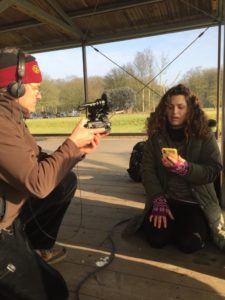 We walked in Westerbork along the same path next to the barbed wire thinking of Etty and how she felt. She was not naive and yet she again and again continued to see life as a whole; to see the pain and to see the beauty of life. In her letters from Westerbork she mentioned a situation in the camp in which she saw a rainbow in the sky, and that made her happy, then she walked to the hospital barracks and the women there saw her smiling so they ask her why you are so cheerful? And she writes to her friends that she wasn’t sure whether to tell the women that actually the real reason why she was so cheerful was because of the rainbow. Seeing the beauty around her during such difficult times did not prevent her from seeing the ugliness. And yet, she was not taken by the horrors that she has been witnessing and living under. She wanted to be the thinking heart in the concentration camp.
We walked in Westerbork along the same path next to the barbed wire thinking of Etty and how she felt. She was not naive and yet she again and again continued to see life as a whole; to see the pain and to see the beauty of life. In her letters from Westerbork she mentioned a situation in the camp in which she saw a rainbow in the sky, and that made her happy, then she walked to the hospital barracks and the women there saw her smiling so they ask her why you are so cheerful? And she writes to her friends that she wasn’t sure whether to tell the women that actually the real reason why she was so cheerful was because of the rainbow. Seeing the beauty around her during such difficult times did not prevent her from seeing the ugliness. And yet, she was not taken by the horrors that she has been witnessing and living under. She wanted to be the thinking heart in the concentration camp.
——
Reflections from Emma Sham-Ba Ayalon – Israel
As we walk and meditate in the darkness of the night in Holland’s transition camp Westerbork from which people were sent to the concentration camps in Polland and never came back, I think of Etty Hillesum who walked the same road and wrote these words:
»The misery here is quite terrible; and yet, late at night when the day has slunk away into the depths behind me, I often walk with a spring in my step along the barbed wire. And then, time and again, it soars straight from my heart — I can’t help it, that’s just the way it is, like some elementary force — the feeling that life is glorious and magnificent, and that one day we shall be building a whole new world. Against every new outrage and every fresh horror, we shall put up one more piece of love and goodness, drawing strength from within ourselves.» (3 July 1942)
We join the ritual when the names of Etty Hillesum and all her family members are read by Manja Prach who established the memorial place in Westerbork. Manja’s father was part of the resistance movement and he knew Etty Hillesum personally and offered to support her in hiding. Etty didn’t want to separate herself from the fate of her people and refused. She was 29 years old when she died. Many times I can feel the richness of her spirit that is so alive but walking in Westerbork the grief of her death also reaches me.
For five days, day and night, nonstop, in a constant rhythm the names of 102,000 people who passed through the camp and were murdered by the Nazis are read. Dina, my Palestinian friend and me, a Jewish Israeli, joined this retreat with the Zen Peacemakers and with Pat and Karin who make a documentary about our peace work that is inspired by Etty Hillesum. Every person who joins reads the names for ten minutes, giving respect to the dead. I am the only Jewish person in our retreat and I am touched by so many people who have no ancestors who died in the war and still feel called to be part of the healing ritual.
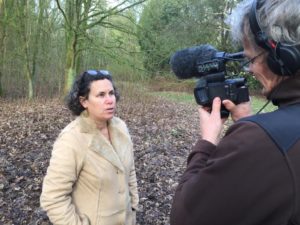 Before us in the reading there is a Jewish old man who read the names of his family members who were killed. He burst out crying after telling each name – She was my grandmother, she was my aunt and so on. After each name the age of the people in the time of their death is mentioned. Dina and me learned to pronounce the Dutch names and to say the numbers in Dutch but when I reach the name Julia Margaretha van Klooten who was killed at the age of seven months my voice is trembles. While reading, I am holding my belly; the motherly womb in which life is created finds it hard to contain the dimension of death. I try to reach out to the invisible souls. Tell them that they are still with us. I feel like roaring the names but find the calmness to read them in peace one by one.
Before us in the reading there is a Jewish old man who read the names of his family members who were killed. He burst out crying after telling each name – She was my grandmother, she was my aunt and so on. After each name the age of the people in the time of their death is mentioned. Dina and me learned to pronounce the Dutch names and to say the numbers in Dutch but when I reach the name Julia Margaretha van Klooten who was killed at the age of seven months my voice is trembles. While reading, I am holding my belly; the motherly womb in which life is created finds it hard to contain the dimension of death. I try to reach out to the invisible souls. Tell them that they are still with us. I feel like roaring the names but find the calmness to read them in peace one by one.
When I studied astronomy, I got to know how huge the universe is and how difficult it is to grasp its dimensions. I learned about the distance from the earth to the sun as an astronomical unit that helps measure those huge distances. I felt that way in Westerbork, that the astronomical dimensions of the murder had somehow become tangible with the steady rhythm of reading the names day and night. Next to the barbed wire that surrounds the camp there are also radio telescopes. I connect with them as my device to the invisible souls. I hear from Alexandra that participates with us in the retreat that these telescopes are trying to get information about the origin of the universe. What a mixture of researching the system of life while remembering the horrors of the system of death.
Dina and I hold a circle for the participants of the retreat with cards that we created. These are 100 cards with quotes by Etty Hillesum in English Hebrew and Arabic. Each participant would take a card and reflect on the relevance of the quote for their life. The magic is in the air and deep intimacy is created. Etty is speaking with us and awakens our inner voice. I do feel that we bring her back to life with those simple cards and the possibility of people and groups to take her words into their own inner work.
I recall a quote by Etty in which she wishes that if she will not survive somebody else will continue from where her life was cut short. This is one of the most touching paragraphs in her diary. I pray to be worthy of this mission:
“Living and dying, sorrow and joy, the blisters on my feet and the jasmine behind the house, the persecution, the unspeakable horrors — it is all as one in me, and I accept it all as one mighty whole and begin to grasp it better if only for myself; without being able to explain to anyone else how it all hangs together. I wish I could live for a long time so that one day I may know how to explain it, and if I am not granted that wish, well, then somebody else will perhaps do it, carry on from where my life has been cut short. And that is why I must try to live a good and faithful life to my last breath: so that those who come after me do not have to start all over again, need not face the same difficulties. Isn’t that doing something for future generations?” (3 July 1943)
About the Authors:
Dina Awwad-Srour – Palestine
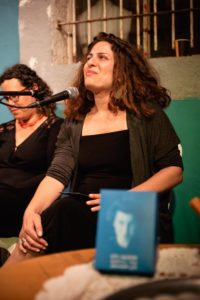 My name is Dina Awwad-Srour. I am a Palestinian, originally from the town of Beit Sahour, a small town in east Bethlehem -Palestine. I now live in Eilaboun, a small Arab village in the north of Israel. I am a lecturer and a writer and my main passion is to empower women and mothers.
My name is Dina Awwad-Srour. I am a Palestinian, originally from the town of Beit Sahour, a small town in east Bethlehem -Palestine. I now live in Eilaboun, a small Arab village in the north of Israel. I am a lecturer and a writer and my main passion is to empower women and mothers.
I encountered Etty’s diaries eight years ago when I was 27 years old, exactly the same age as Etty was when she started writing her diaries. I immediately felt connected to her and her challenges as a young woman. I learned a lot from her about love and freedom; for example how to stay independent and free even when you love someone. For my spiritual path I learned a lot from her about prayer and connecting to God.
As a Palestinian, I find Etty very inspiring as she helped me learn to look at the Palestinian/Israeli conflict from a wider angel beyond a black & white or a good & evil perspective. I learned to ask questions and look for the answers within myself. I learned from her to see the human inside every Israeli soldier. I gained a deeper understanding of how war is a system that misuses young men.
Emma Sham-Ba Ayalon – Israel
My name is Emma Sham-Ba Ayalon. I am an artist, a poet, and a Rabbi. I got to know Etty Hillesum’s diaries 15 years 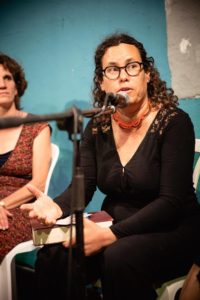 ago and since then her inner language became more and more a part of myself.
ago and since then her inner language became more and more a part of myself.
As a Jewish woman who grew up in Israel, I know that we carry a trauma that influences us as individuals and as a nation. The trauma that we carry from the Holocaust plays a big role in our behaviour as a nation and especially in the way we treat Palestinians. As a peace worker I know that we cannot go forward toward a vision of peace if we don’t heal the wounds from the past.
Etty wanted to be a remedy of healing. I believe that her spiritual path that allowed her to never hate and to find inner peace even in the very dark times of the Holocaust, can serve as a healing force and as a role model for what is possible for us as Jews and as humans. Her writings deeply healed my heart and helped me step out of a victim’s perspective and to find the power from within myself to contribute to the creation of a better world.
—–
For more on the development of his collaboration, please read previous Zen Peacemakers publication «The Aim of Meditation, to Listen Everywhere: Palestinian & Israeli Peacebuilders Reect on the Wisdom of Holocaust writer Etty Hillesum, Captured in Cards«.

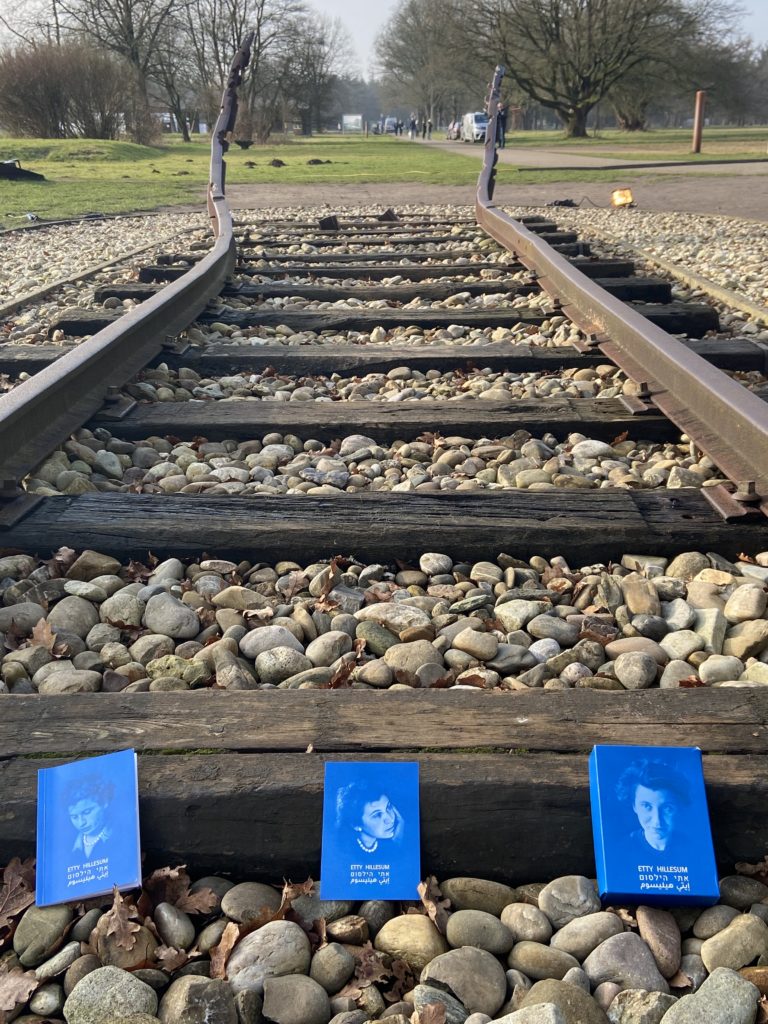

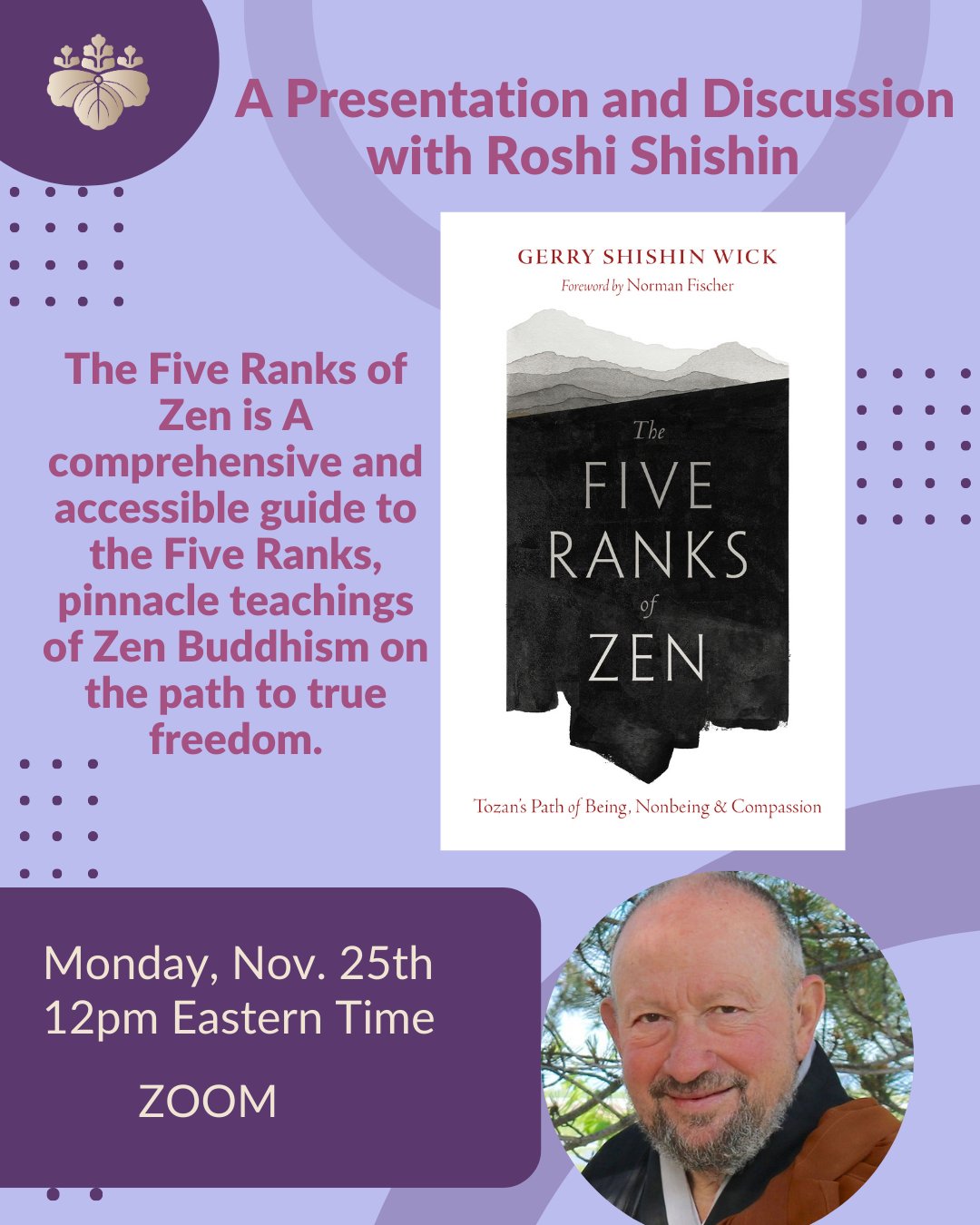
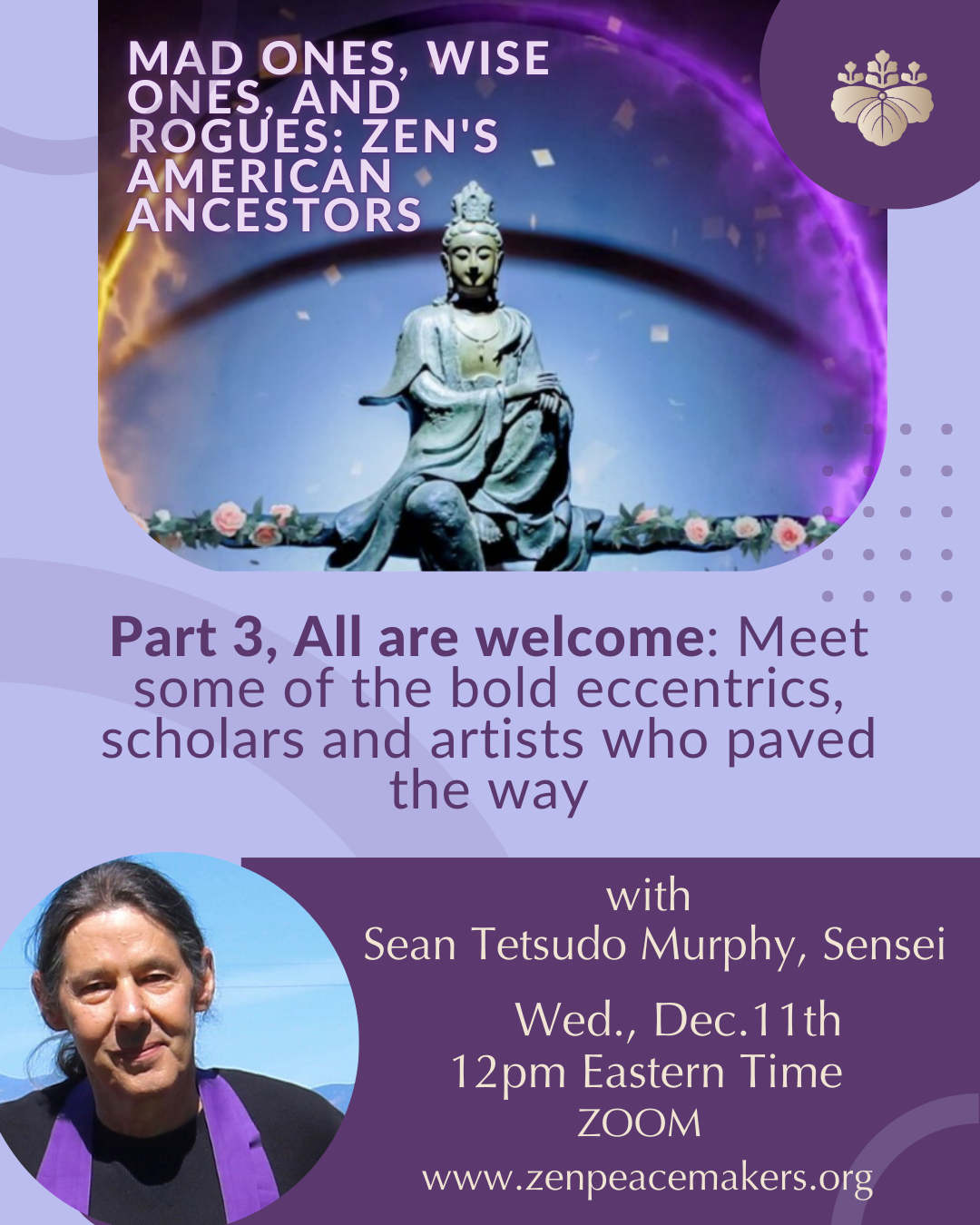
Un comentario
This was a moving and a compassionate story. Two people walking to seek answers, and know each other’s ancestral and personal trauma.
I appreciate walking with them with open wounds and a vision fo healing.